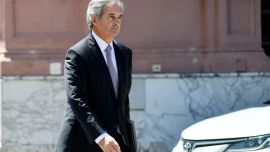Argentine President Javier Milei's decision to withdraw his negotiators from the climate change conference in Baku breaks with the climate foreign policy maintained by his predecessors and fuels fears of Argentina's withdrawal from the Paris Agreement, environmentalists and politicians told AFP.
"Withdrawing from decision-making on an issue as sensitive and critical as financing (of aid for environmental policies) is a lost opportunity for those who can benefit from the agreements made in Baku," said Greenpeace Argentina in a statement, which considered the withdrawal from COP29 "a very bad sign."
The deputy for the opposition Civic Coalition Maximiliano Ferraro said on Friday: "If Milei's government decides to leave the Paris Agreement, we would be facing important legal and constitutional implications. But, beyond that, we would be entering a foggy path of isolation and taking us to a place on the geopolitical map where only Iran, Libya and Yemen await us."
His party repudiated in a statement the government's decision to withdraw from COP29 on Wednesday.
"In Baku, essential issues for the global energy transition and for green finance are being discussed, which represent investment opportunities that Argentina cannot afford to ignore," warned the social democratic party.
Since taking office on December 10, the ultra-liberal president has drastically reduced policies to curb climate change in Argentina, responsible for 0.9% of greenhouse gas emissions and the 22nd most polluting country in the world, according to UN data.
"Nature must serve human beings and their well-being, not the other way around," Milei said in June. "Environmental problems must put the individual at the center (...) that is why the main environmental problem we have is extreme poverty. And this can only be solved if we take advantage of our resources."
In line with this thinking, he reduced the Ministry of Environment to a sub-secretariat and redistributed its powers, in addition to eliminating the Native Forest Protection Fund.
The Argentine government withdrew its representatives from Baku because it is rethinking its role in international climate diplomacy, according to Foreign Minister Gerardo Werthein.
"We are re-evaluating our strategy on all issues related to climate change," Werthein explained to the Washington Post.
The foreign minister assured the American media that Buenos Aires has not made any decision on whether to remain or leave the Paris Agreement.
In December of last year, Marcia Levaggi, the newly appointed representative of climate diplomacy by Milei, assured at COP28 that Argentina would remain within the Paris Agreement. But almost a year later and in view of what happened, there are doubts that it will comply.
Ready for battle
"There is growing concern about the possibility that Argentina will leave the Paris Agreement," Oscar Soria, director of The Common Initiative, an environmental organization based in New York, told AFP.
However, a measure of that nature needs the support of Congress. "It cannot be done with a simple decree," he warned.
Argentina ratified the Paris Agreement in 2016 and therefore has constitutional status.
A decision in this sense would represent breaking "solid legislation on climate action," said the environmentalist. "If it does, we are ready for a legal battle," he added.
In its article 41, the Argentine Constitution establishes the right of the inhabitants to enjoy a "healthy" environment whose productive activities "satisfy the present needs without compromising those of future generations."
If Milei decides to go against these principles "he will be violating the right of millions of Argentines to a healthy environment and such an irresponsible decision will have negative consequences for the economy," said Soria.
The action, a hope
For biologist Guillermo Folguera, from the scientific research center Conicet, hope is placed in civil organizations whose action puts a limit on presidents "like Milei, who says without blushing that the environment has to be used only to generate goods and not as a place to live."
In Argentina "there are hundreds of assemblies and communities organizing to confront these corporations to which Milei came to continue giving advantages, and they are the hope for how to think of a Latin American project to confront environmental plunder," he said.
For Soria, "global climate action will continue, with or without Argentina. This was demonstrated in the case of the United States when Donald Trump made the decision to abandon the Paris Agreement in 2017. Many far-right leaders have underestimated the Paris Agreement before."
Ferraro suggested that it could have been an attempt by Milei to ingratiate himself with Trump. "I wonder if it was nothing more than a show put on by President Milei to offer him up as a ritual sacrifice at his meeting with the President-elect of the United States, Donald Trump. An irresponsible, worrying and highly reprehensible decision," he added.
by Sonia Avalos, AFP


















Comments